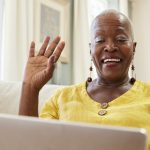Taking Care of Yourself During a Pandemic: 5 Tips for Self-Care!
- Written by: CHEERS Team

As early childhood educators, parents, and caregivers, it is natural to prioritize the well-being of others over your own. However, in the same ways that we care for children in our centres and families, it is just as important to take care of ourselves. As the saying goes, “you cannot pour from an empty cup”. To give our best to others, we must ensure we are at our best. By viewing self-care as a necessity, rather than a luxury, we are able to prioritize taking care of ourselves so we can better care for others.
As coronavirus disrupts life as we know it, many of us feel stress and angst about an uncertain future. Now more than ever, it is important that we consistently check-in with ourselves and make sure we are filling our cups.
The following are 5 tips to incorporate into your self-care routine, to ensure you are taking care of your body holistically.
1. Cook Yourself A Nutritious Meal

It is important to take care of yourself from the inside out! Taking the time to cook yourself a nutritious meal you enjoy is definitely self-care and is great for your physical health as well. Healthy foods nourish your body and mind. This can help energize you during days where you feel sluggish. The process of cooking a meal that you enjoy also gives you an opportunity to practice mindfulness, be present ‘in the moment‘, and take your mind off of life’s other stressors. For some inspiration, here are some delicious healthy meals we have been loving this season:
2. Take Time Away from Social Media
 Social media has been both a blessing and a curse throughout COVID! In the midst of the global pandemic, it has been necessary to refrain from in-person interactions. Therefore, many of us have turned to social media and technology in order to connect with our social circles virtually. However, it is important to be aware of your online habits. Increased usage of social media has been linked to feelings of anxiety and depression.1 While we all want to stay connected, it is important to make a conscious decision to not increase dependency on social media during this time. By putting your phone down and closing your laptop, you allow yourself to be present and use your time to do something else you enjoy. Taking time for yourself might look like:
Social media has been both a blessing and a curse throughout COVID! In the midst of the global pandemic, it has been necessary to refrain from in-person interactions. Therefore, many of us have turned to social media and technology in order to connect with our social circles virtually. However, it is important to be aware of your online habits. Increased usage of social media has been linked to feelings of anxiety and depression.1 While we all want to stay connected, it is important to make a conscious decision to not increase dependency on social media during this time. By putting your phone down and closing your laptop, you allow yourself to be present and use your time to do something else you enjoy. Taking time for yourself might look like:
- Reading a book
- Creating art
- Doing a puzzle
- Practicing music
- Making the perfect cup of coffee
- Journaling
- Going for a walk
3. Contact A Loved One

During times of stress and uncertainty, it can be very easy to isolate yourself, which can lead to feelings of loneliness. Given the current environment of COVID and the need to practice physical distancing, it has become especially easy to feel isolated. As the entire world navigates through this pandemic, it is important to remind yourself that you are not alone. Combat this sense of loneliness by setting aside some time to talk to family or friends. It is a great way to feel connected to your larger community. To make the connection even more meaningful try to connect with a phone call or a video chat instead of reaching out over text or social media. It can be very comforting to hear someone’s voice, and chances are they will enjoy hearing yours.
4. Practice The 54321 Method If You Are Feeling Anxious

If you are feeling stressed, overwhelmed, or as though you can’t catch your breath, the “54321 method” can be a valuable technique.2 Designed to help you ground yourself, the method prompts you to become aware of your surroundings by identifying:
- FIVE things you can SEE
- FOUR things you can TOUCH
- THREE things you can HEAR
- TWO things you can SMELL
- ONE thing you can TASTE
This process can be repeated as often as necessary. This technique helps you become more in-tune with your physical reality and less focused on the stressors that are causing you to feel anxious. It is a great exercise to help you practice being present in the moment. This is also a wonderful technique to share with children, as it allows them to become in-tune with themselves and their body they too can experience feelings of anxiety.
5. Reframe “Exercise” and Move Your Body
 Physical activity has so many benefits for your mind and body. However, sometimes, the idea of “exercise”, especially during times of stress, can seem like a daunting task. It can be beneficial to reframe the idea of “exercise” and move your body on your own terms. That might mean dancing to some music, taking the dog for a walk, or stretching your muscles. An active lifestyle has been known to reduce feelings of perceived stress, improve feelings of self-control, and increase self-confidence and self-image.3 Making movement a habit (even when you don’t feel like it) is one of the most important things to incorporate into your self-care routine.
Physical activity has so many benefits for your mind and body. However, sometimes, the idea of “exercise”, especially during times of stress, can seem like a daunting task. It can be beneficial to reframe the idea of “exercise” and move your body on your own terms. That might mean dancing to some music, taking the dog for a walk, or stretching your muscles. An active lifestyle has been known to reduce feelings of perceived stress, improve feelings of self-control, and increase self-confidence and self-image.3 Making movement a habit (even when you don’t feel like it) is one of the most important things to incorporate into your self-care routine.
Self-care is about regular maintenance.
The goal is to be in tune with your body and your mind so that you can manage stressors and be resilient. Be kind to yourself, and use the tips above as frequently as you can. Self-care isn’t selfish, self-care is responsible adulting!
References
-
Karim, F., Oyewande, A. A., Abdalla, L. F., Chaudhry Ehsanullah, R., & Khan, S. (2020). Social Media Use and Its Connection to Mental Health: A Systematic Review. Cureus, 12(6), e8627. https://doi.org/10.7759/cureus.8627
-
Smith, Sara. 5-4-3-2-1 Coping Technique For Anxiety. Retrieved October 16, 2020 from https://www.urmc.rochester.edu/behavioral-health-partners/bhp-blog/april-2018/5-4-3-2-1-coping-technique-for-anxiety.aspx
-
Insel, P., Roth, W., Irwin, J., & Burke, S. (2016). Core Concepts in Health. (2nd ed.) Canada: McGraw-Hill Ryerson Ltd